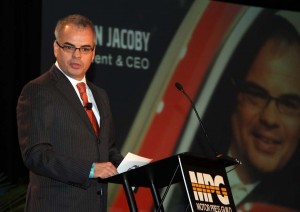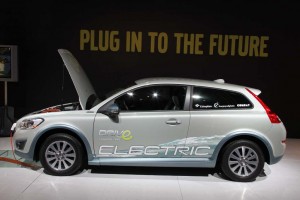
The hare beats the tortoise? Stefan Jacoby plans to get Volvo moving fast under its new Chinese owners.
According to Aesop, it took the slow but steady tortoise to beat the hare. Don’t count on it, says Volvo Cars’ news CEO, Stefan Jacoby. In today’s ever more competitive auto market, “the fast ones are eating the slow ones.”
Never known for setting a benchmark pace, the former Volkswagen executive says Volvo now plans to be “leaner, better, smarter and, especially, faster,” as it adjusts to life under Chinese ownership.
Sold earlier this year by Ford Motor Co., which decided it needs to get back to basics, Volvo hopes to more than double sales – to 800,000 annually – by 2020. That goal will not only require speed by a shift in focus, Jacoby told TheDetroitBureau.com. Look for Volvo to put more emphasis on emerging markets, including places like Brazil, as well as China. But, Jacoby cautioned, don’t expect the maker to walk away from the U.S., which has traditionally served as its largest single source of sales.
The sale of Volvo to Zhejiang Geely Holding Group came at a critical came, said Jacoby. The maker has suffered a significant slide, in recent years, only partially to blame on the global economic downturn. Global sales are expected to reach just 380,000 for all of 2010, and in the U.S. demand is off almost 60% from its 2004 peak – from 140,000 down to just 60,000.
But Jacoby is the proverbial optimist, looking at what he sees as a half-full glass. “We are standing at the bottom looking up,” he said.
Part of the challenge will be to find the way to take advantage of the resources – and potential – offered by the Swedish maker’s new parent and Volvo’s Chinese sibling, the Geely brand.

There are "three pillars" to Volvo's battery car strategy, says Jacoby, including pure battery-electric vehicles, plug-ins and performance-oriented hybrids.
There are no plans to start blending the two brands, the German executives repeatedly stressed. Geely is focused on the booming Chinese home market while Volvo is a truly global brand. But there’s an asterisk following that comment.
Speed may be critical, but so are economies of scale, Jacoby acknowledged, something that neither Zhejiang Geely brand can generate on their own, at least not when compared to giants like GM, Ford, Toyota or Volkswagen. So some careful cooperation will be necessary.
Volvo is, “of course, looking for collaboration with our sister company,” said Jacoby, “where it has its advantages.” And that could mean “shared modules” for future products. Whether that will be limited to parts or components or expanded to cover entire vehicle platforms remains to be seen.
Being part of a Chinese company could provide a number of opportunities, notably including access to what is now the world’s largest – and fastest-growing – national market. It’s a market Volvo has so far failed to penetrate to any significant degree.
The maker is in the midst of working with Zhejiang Geely to develop a Chinese strategy and should have something significant to announce “before the end of the year,” said Jacoby. While he would not discuss details, that would likely include plans to produce at least some Volvo products in the Asian nation.
That would help address one of the most serious challenges facing Volvo: lopsided exchange rates, “a very difficult problem when exporting from Europe.”
Some observers have speculated that Volvo might even try to export some products from China to the United States, though that does not appear likely, at least not in the near-term.
So, is Volvo still considering an American assembly plant, as has long been debated? “Thinking, yes,” said Jacoby. “Plans, no.”
Once seen as a fast-track executive with the massive Volkswagen, which happens to rival General Motors for dominance of the Chinese market, Jacoby stunned the relatively tight-knit automotive community when he tendered his resignation and announced plans to take over the Swedish company following its sale by Ford.
For his part, Jacoby admits being surprised himself when he was approached by Volvo’s new owners – whom he describes as “very tough managers.” But he quickly adds that he likes “challenging positions.”
Industry sources say Jacoby was actually a logical pick considering the time he spent in China, with Volkswagen, during which the make had a solid lock as the market’s largest manufacturer.
Suggesting that “The Volvo brand wasn’t properly embraced by its former owners,” Jacoby insists the marque has “a lot of potential.” But there’s little doubt the transition comes at a particularly challenging time. Not only are new markets challenging the old order, but new technologies could come to overtake old, notably including the internal combustion engine.
Volvo is working a variety of clean, high-mileage technologies, Jacoby told TheDetroitBureau.com, including new diesel technology that may yet make it to the diesel-phobic States.
The maker is taking a “three-pillar” approach to electrification, meanwhile, starting with a battery-electric vehicle Volvo will begin fleet testing, next year, in the U.S., China and Europe. The initial plan is to produce 1,000 of the BEVs, “and if demand pops up we can produce more,” said Jacoby.
A diesel-powered plug-in hybrid, based on the V60 wagon, is set for a European launch in 2012, though the American version is more likely to rely on a gasoline-electric driveline.
Meanwhile, Volvo will explore the performance potential of electric propulsion with an otherwise conventional hybrid “optimized to give more power.” The all-wheel-drive system will put out about 250 horsepower, said Jacoby, with the electric portion of the driveline able to kick in 80 hp for an extra bit of boost.
Of course, Volvo also has to remain focused on safety, the attribute buyers most often associate with the brand. But with its competitors all hoping to chisel away at that perceived lead, Jacoby plans to fight back by showing that Volvo cars have other advantages that should put them back on consumer shopping lists.
